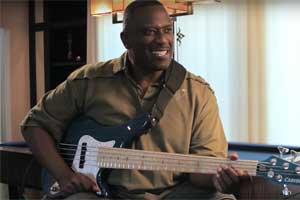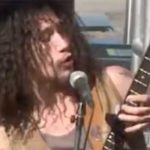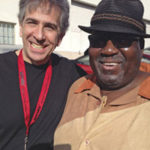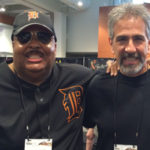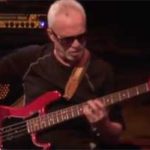Groovemaster recounts his experiences in NYC and LA, being musical director for the Isley Brothers, his appearance on Survivor and lots more!
Exclusive interview with FBPO’s Jon Liebman
June 20, 2011
Born and raised in New York City, Sekou Bunch was exposed to the arts, virtually from the very beginning. As a young child, Bunch showed great promise as a painter and dancer, both of which he pursued passionately. Upon receiving his first bass around 1974, Bunch proved to be a quick study and soon began playing local gigs and jam sessions. At 17, Sekou teamed up with GRP artist Tom Browne, with whom he recorded the best-selling funk classic Funkin’ for Jamaica album.
Sekou eventually moved to Los Angeles, where his career picked up steam. While based in LA, Bunch toured and recorded with the late George Howard and collaborated with producers Angela Winbush and Ronald Isley and was ultimately named musical director for the Isley Brothers, a position he held for eight years.
Throughout his distinguished career, Sekou Bunch has performed and/or recorded with Quincy Jones, Rod Stewart, Stevie Wonder, Roger Daltry, Whitney Houston, Michael Jackson, Luther Vandross, Anita Baker, Ray Charles, Chaka Khan, Paul Anka, George Benson, Wayne Shorter, the Winans, Lionel Richie, Toni Braxton, Freddie Hubbard, Roberta Flack, Liza Minneli and many others. His solo CD, The Next Level, was released in 2008.
FBPO: How would you describe your upbringing? I understand you were exposed to all of the arts – music, painting, dance …
SB: I had a great upbringing with regards to the arts, painting and dancing. I was influenced in dance by James Brown and did a James Brown review with my brothers, always coming away with first prize in talent shows. I began drawing and painting as early as I can remember. My mother invested in my artistic talent and sent me weekly to a private art teacher. My dad promoted me in talent shows, as well.
I was exposed to all forms of music in the home, from Miles Davis, Ella and Sarah to Wes Montgomery, Mongo Santamaría and Celia Cruz. My uncle, Quinton Canton, played timbales in Celia’s band. Also, I was heavily exposed to Jimi Hendrix, Santana and all the major rock groups of the sixties and seventies. R&B/funk was definitely my era of music growing up, from Sly, The Jackson Five, the Isley Brothers, Aretha, Rufus, the Ohio Players, Stevie Wonder and all of Motown. I was exposed to classical music very early as well. My dad played classical piano and violin.
FBPO: Tell me about the Black Executives, your dance group.
SB: The Black Executives was my brothers’ group. They always took first prize in talent contests in the Bronx. Unbeknownst to many, I am one of the early pioneers of what is known today as “break dancing.” I was part of the famed DJ Kool Herc’s dance crew at all his parties in the Bronx, where it all started. That’s where rap started, as well.
FBPO: How did you end up as a bass player?
SB: My Uncle Ralph played guitar…
FBPO: Ralph Bunche was your uncle?
SB: Not that Ralphe Bunche. He spelled his name with an ‘e’ at the end. My uncle is Ralph Bunch (no ‘e’). Just a coincidence. Anyway, my Aunt Ruby bought uncle Ralph a guitar one year for his birthday. When I saw it, I was mesmerized. I had never seen a real guitar till then. I was about 8 years old at the time.
As I got older I asked my uncle if he could show me how to play. He said yes, but the chords were too hard to finger. I asked him if there was something else I could play and he suggested I try the bass. So I did and the rest is history. I later came to find out that my grandfather Marion Bunch played upright bass very well and toured with his brother around the country.
FBPO: How do you think growing up in New York affected you, musically and artistically?
SB: New York is the melting pot of culture. Music and the arts are very big there. You really have to have talent to make it there. The competition is very tough. For every great musician that makes it in New York, there are twenty others who are equally great, but don’t make it.
New York kept me on my toes. You couldn’t sleep on anybody. Every time I turned around, there was another musician who was amazing. The bar was very high. I grew up around masters and soon-to-be graduates of Juilliard and Manhattan School of Music and other musical breeding grounds in Manhattan, Brooklyn and Queens.
FBPO: Why did you leave New York for Los Angeles?
SB: By the time I was 18, I had earned my first gold record, toured the United States, got married, moved to Cleveland to raise my children and began my solo career on Sugar Hill Records. It was time to check out the West Coast cats. I knew my career wasn’t complete unless I joined the likes of George Duke, Quincy Jones, Greg Phillinganes, Ricky Lawson and all the other TV stuff that came out of Hollywood. So I went west and have been here since.
FBPO: New York and LA are different in so many ways. What was it like making that transition?
SB: Actually, it was quite easy. After growing up in a crowded city with subways and concrete, LA was refreshing. I knew I had arrived! LA was the top of the line. Now I was rubbing shoulders with the other side of the industry. LA became the mecca for musicians. By the time you arrive there, you’d better have your game together. It was a new beginning and I had to get acclimated quickly.
FBPO: Any culture shock?
SB: Not really. What I thought was a mysterious mist in the air turned out to be smog! [Laughs!] Besides that, in order to get anywhere you had to drive. As far as the music scene goes, I was well equipped and ready. It did, however, take me a minute to find out who was acting and who wasn’t.
FBPO: Tell me about your experience as musical director for the Isley Brothers.
SB: That was great! I grew up listening to those guys. I was a kid and hadn’t even begun playing the bass yet. I knew all their music. Ron Isley told me I would always be an original Isley Brother. I don’t think he said that to other band members except for Jimi Hendrix. Having co-produced them on the Tracks of Life CD and acting as musical director for the Isley Brothers Live CD, I am proud to have been named amongst such legends as the Isley Brothers.
FBPO: What was that whole Survivor experience all about?
SB: Time out! [Laughs!] So I’m eating lunch with a friend and I get this phone call about being on a reality show. I was like, “Cool! Finally a regular TV show playing bass.” I asked where the session was and the lady on the phone said, “Uh… Do you know what our show is about?” I said, “I think so. What sound stage are you at?” She then said, “It’s a show about living out in the wilderness” and I said, “So, you’re taking a band on tour with the show?” And she said “Why don’t you take a look at the website and call me back?” I went to the web, called her and asked her, “When does the gig start?” She then said, ”Um… We want you to be a contestant on the show.” I started looking for the Punk’d cameras then … [Laughs!] the rest is history. It was the best camping trip as an adult. It was real fun and real excitement. No props. I loved it!
FBPO: Tell me something you learned from Quincy Jones.
SB: I learned how to produce, be cool and get people together.
FBPO: What’s keeping you busy these days?
SB: I am finishing up a Michael Jackson tribute CD and two jazz CDs. I’m also releasing a book on electric bass studies and a compilation transcription book on hits I’ve played on. Also, I have the number one bass on the market, designed by Carvin and me, the SB4000 and SB5000. We took first place at NAMM 2011. I also have a new bass cabinet design coming soon. It will revolutionize bass cabinets! Stay tuned.
FBPO: What else would you like to accomplish in your life and career that you haven’t achieved yet?
SB: Get my doctorate in music, continue to design product, open a school for electric bass studies, visit rare places, villages and towns, write a symphony and direct and score a movie.
FBPO: What would you be if you weren’t a bass player?
SB: A lawyer or a criminal justice official. It runs in my family.
